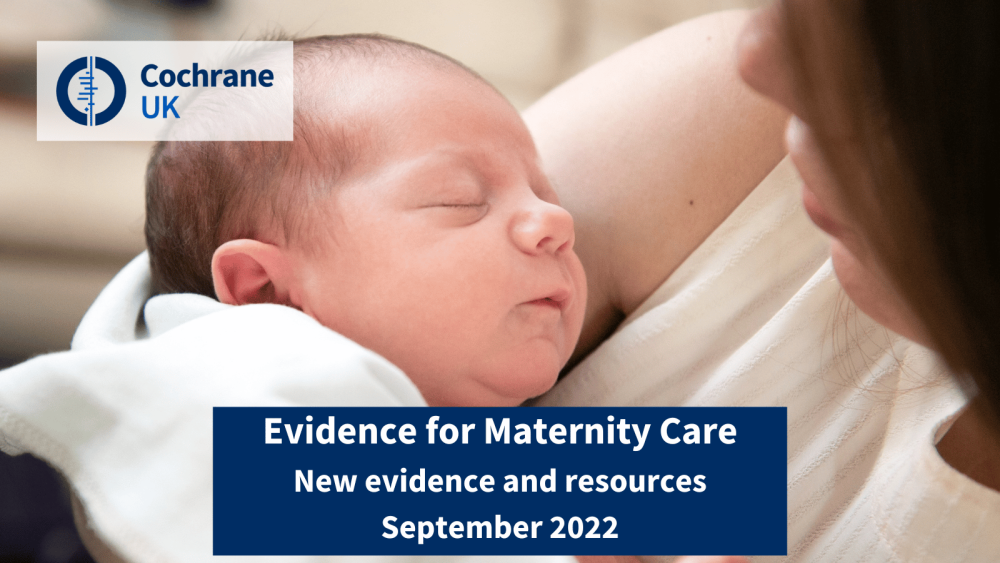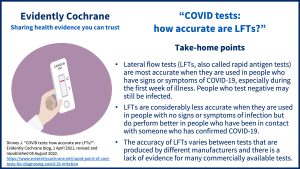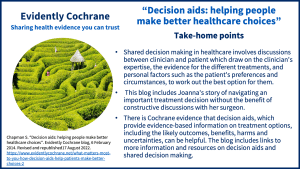The latest evidence and resources for midwives and clinical support staff.
Please note, unlike the rest of our blogs, our ‘Evidence for Maternity Care: new evidence and resources’ blogs will not be updated.
You can scroll through this page to see the topics below:
- News and events
- Antenatal Care (Tocolytics for delaying preterm birth; corticosteroids for accelerating fatal lung maturation)
- Labour and birth (maternal postures)
- COVID-19
- Decision aids
- Treating urinary incontinence in women
News and events
A free webinar for anyone making health decisions
Join us for a free webinar for anyone making health decisions on Thursday 20th October 2022, 7-8pm (BST) – Making health decisions: what’s best for you?
Brian, Heather and Sarah, who have had to make some big health decisions, in different circumstances, and Becky, a doctor and former GP, discuss their experiences and some important elements of making health choices. This session will be facilitated by our Patient Co-ordinator Emma Doble and Dr Rufaro Ndokera, a former Cochrane UK Fellow.
Antenatal care
Tocolytics for delaying preterm birth
The Cochrane Review Tocolytics for delaying preterm birth: a network meta‐analysis (August 2022) found that, compared with placeboAn intervention that appears to be the same as that which is being assessed but does not have the active component. For example, a placebo could be a tablet made of sugar, compared with a tablet containing a medicine. or no tocolytic treatmentSomething done with the aim of improving health or relieving suffering. For example, medicines, surgery, psychological and physical therapies, diet and exercise changes.:
- “all tocolytic drug classes that we assessed (betamimetics, calcium channel blockers, magnesium sulphate, oxytocin receptor antagonists, nitric oxide donors) and their combinations were probably or possibly effective in delaying preterm birth for 48 hours, and 7 days
- were associated with a range of adverse effects”
Uncertainties remain about their effects on neonatal outcomesOutcomes are measures of health (for example quality of life, pain, blood sugar levels) that can be used to assess the effectiveness and safety of a treatment or other intervention (for example a drug, surgery, or exercise). In research, the outcomes considered most important are ‘primary outcomes’ and those considered less important are ‘secondary outcomes’. such as neonatal and perinatal mortalitydeath, and on safetyRefers to serious adverse effects, such as those that threaten life, require or prolong hospitalization, result in permanent disability, or cause birth defects. outcomes such as maternal and neonatal infection.
Corticosteroids for accelerating fetal lung maturation
The updated Cochrane Review Different corticosteroids and regimens for accelerating fetal lung maturation for babies at risk of preterm birth (published August 2022) includes 11 trialsClinical trials are research studies involving people who use healthcare services. They often compare a new or different treatment with the best treatment currently available. This is to test whether the new or different treatment is safe, effective and any better than what is currently used. No matter how promising a new treatment may appear during tests in a laboratory, it must go through clinical trials before its benefits and risks can really be known. (2494 women and 2762 infants), all of which recruited women who were at increased riskA way of expressing the chance of an event taking place, expressed as the number of events divided by the total number of observations or people. It can be stated as ‘the chance of falling were one in four’ (1/4 = 25%). This measure is good no matter the incidence of events i.e. common or infrequent. of preterm birth or had a medical indication for preterm birth and were in high income countries. The authors conclude:
- it remains unclear whether there are important differences between dexamethasone and betamethasone, or between one regimen and another
- while for most infant and early childhood outcomes there may be no difference between these drugs, for several important outcomes for the mother, infant and child the evidence was inconclusive and did not rule out significant benefits or harms
- the evidence on different antenatal corticosteroid regimens was sparse.
Labour and birth
Maternal postures
A new Cochrane Review Maternal postures for fetal malposition in labour for improving the health of mothers and their infants (published August 2022) is a WHO priority review. The authors conclude: “the use of hands and knees posture or lateral postures in women in labour with a fetal malposition may have little or no effect on health outcomes of the mother or her infant. If a woman finds the use of hands and knees or lateral postures in labour comfortable there is no reason why they should not choose to use them.”
COVID-19
Cochrane is continuing to produce new and updated reviews in response to the pandemic. We have blogged about many of them and this blog COVID-19 evidence: a Cochrane round-up brings together a large collection of evidence and resources, starting from when this evidence was first being produced in spring 2020.
Plus, we have two blogs on COVID-19 treatments:
Like the reviews themselves, all our blogs are updated to reflect new evidence.
The lead author of the recently-updated Cochrane Review on the accuracy Rapid, point‐of‐care antigen tests for diagnosis of SARS‐CoV‐2 infection (published July 2022) has blogged about it in Covid tests: how accurate are LFTs?
There is also a shorter version – Covid tests: how good are LFTs? A short blog.
Interventions to increase COVID‐19 vaccine uptake: a scoping review (published August 2022) has identified and mapped a variety of interventions for increasing COVID‐19 vaccine uptake or decreasing vaccine hesitancy. The authors say “Our results demonstrate that this is an active field of research with 61 published studies and 35 studies still ongoing. This review gives a comprehensive overview of interventions to increase COVID‐19 vaccine uptake and can be the foundation for subsequent systematic reviewsIn systematic reviews we search for and summarize studies that answer a specific research question (e.g. is paracetamol effective and safe for treating back pain?). The studies are identified, assessed, and summarized by using a systematic and predefined approach. They inform recommendations for healthcare and research. on the effectivenessThe ability of an intervention (for example a drug, surgery, or exercise) to produce a desired effect, such as reduce symptoms. of interventions to increase COVID‐19 vaccine uptake.”
Other Cochrane resources on COVID-19
You can find Coronavirus (COVID-19) Special Collections here
Cochrane COVID-19 Podcasts offer short summaries of Cochrane COVID-19 reviews from the authors themselves. A good way to hear the latest Cochrane evidence in under 5 minutes each.
You can find Cochrane Clinical Answers related to COVID-19 here. Cochrane Clinical Answers (CCAs) provide a readable, digestible, clinically-focused entry point to rigorous research from Cochrane ReviewsCochrane Reviews are systematic reviews. In systematic reviews we search for and summarize studies that answer a specific research question (e.g. is paracetamol effective and safe for treating back pain?). The studies are identified, assessed, and summarized by using a systematic and predefined approach. They inform recommendations for healthcare and research.. They are designed to be actionable and to inform point-of-care decision-making. Each CCA contains a clinical question, a short answer, and dataData is the information collected through research. for the outcomes from the Cochrane Review deemed most relevant to practising healthcare professionals.
Decision aids
Our blog Decision aids: helping people make better healthcare choices has been revised and republished to include recent evidence and resources.
Treating urinary incontinence in women
A new Cochrane overviewCochrane Overviews of reviews (Overviews) are intended to summarize multiple Cochrane Reviews addressing the effects of two or more potential interventions (for example a drug, surgery, or exercise) for a single condition or health problem. of reviews Conservative interventions for treating urinary incontinence in women (published September 2022) has found that:
- pelvic floor muscle training (PFMT) is more beneficial than control for all types of urinary incontinence for outcomes of cure or improvement and quality of life
- if PFMT is more intense, more frequent, with individual supervision, with/without combined with behavioural interventions with/without an adherence strategy, it is probably more effective.
- for cure or improvement, cones are more beneficial than control (but not PFMT) for women with stress urinary incontinence
- electrical stimulation is beneficial for women with urgency urinary incontinence
- weight loss results in more cure and improvement than control for women with all types of urinary incontinence combined.
Join in the conversation on Twitter with @SarahChapman30 and @CochraneUK or leave a comment on the blog.
Please note, we cannot give medical advice and do not publish comments that link to individual pages requesting donations or to commercial sites, or appear to endorse commercial products. We welcome diverse views and encourage discussion but we ask that comments are respectful and reserve the right not to publish any we consider offensive. Cochrane UK does not fact-check – or endorse – readers’ comments, including any treatments mentioned.
Sarah and Selena have nothing to disclose.





